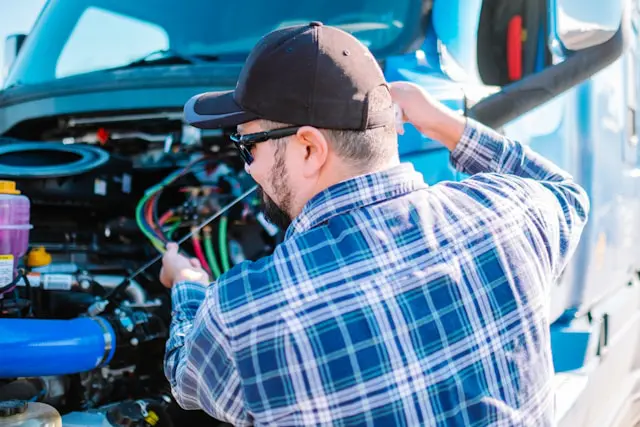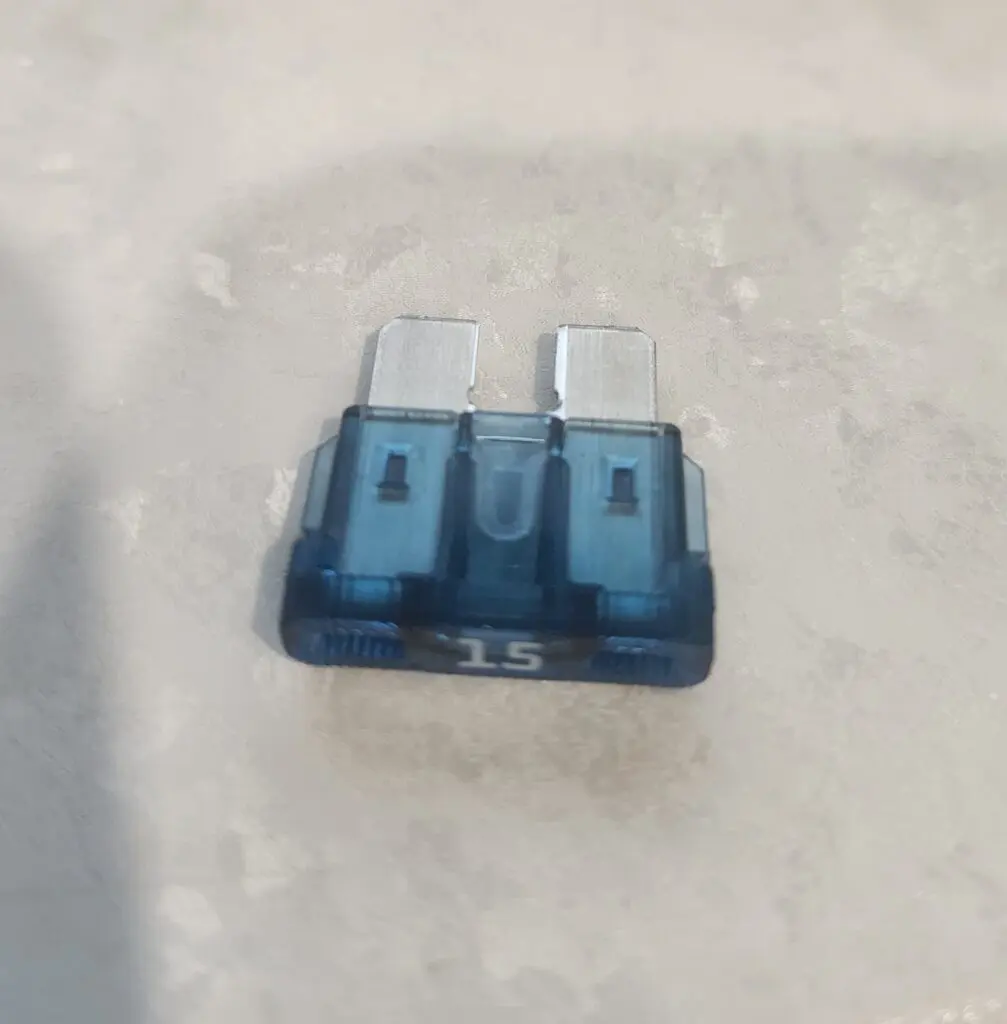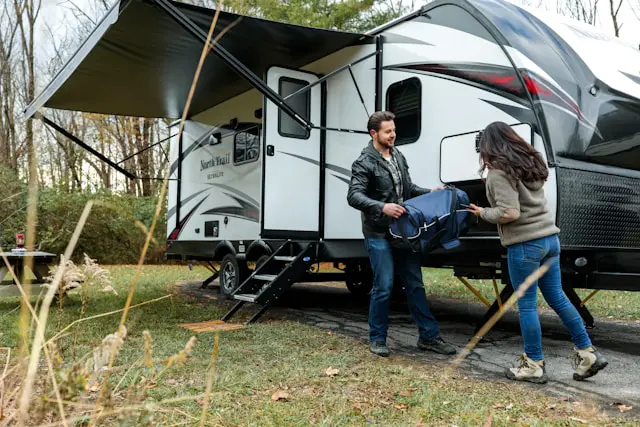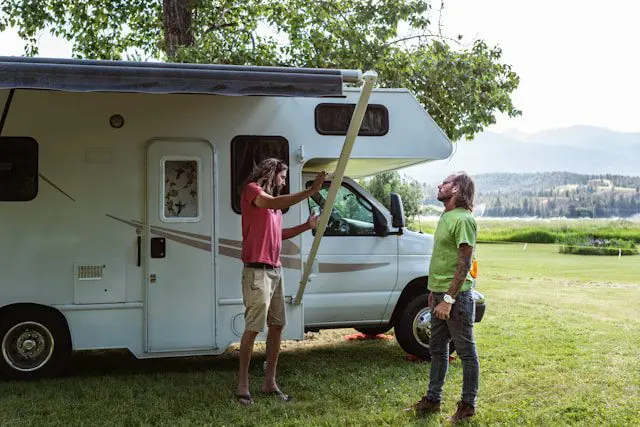Regular RV maintenance is crucial for extending the life of your vehicle and ensuring safe, enjoyable travels. Many RV owners overlook the importance of routine upkeep, which can lead to costly repairs and inconvenience down the road. In this ultimate guide, we’ll walk you through a detailed RV maintenance checklist, including monthly, seasonal, and yearly tasks that will keep your rig running smoothly.

Before Each Trip | Monthly RV Maintenance | Seasonal RV Maintenance | Yearly RV Maintenance | Grow Your Skills | Key Points
RV Maintenance Checklist Before Each Trip
Here are some key RV maintenance steps to help ensure a smooth trip and keep your vehicle in good condition.
- Clear the Roof and Slide-outs: This is one that is easy to forget but very important for optimal functioning of your slide-outs.
- Inspect and Inflate Tires: This includes your towing vehicle, if you have one. Check for cracks and damage.
- Turn Off the Propane
- Check Your Lights
- Check Engine Oil Levels
- Check Your Brake Controller (if towing): Make sure your trailer brakes are functioning properly. If your truck doesn’t have a brake controller installed, we recommend the portable CURT Echo Mobile Trailer Brake Controller. It connects to an app on your phone for easy adjusting and monitoring of your trailer brakes. You can also set up different profiles and use it with other trucks and trailers.
- Examine Your Hitch: This includes the sway bars. I’ve taken my trailer through many dips that have grinded on the bars’ chains and will eventually require replacement.
- Check underneath your RV or trailer: This is good for maintenance as well as to make sure you don’t run over anything inadvertently on your way out.
Monthly RV Maintenance Checklist
Check Engine Fluids
Routine checks on engine oil, coolant, brake fluid, and transmission fluid are essential. Top them up or replace them as needed to ensure your engine runs smoothly and efficiently. Check for leaks and loose parts. This goes for both your RV and towing vehicle.
Battery Maintenance
Regularly clean the battery terminals to prevent corrosion. Ensure the battery is fully charged and top off water levels if you’re using a lead-acid battery. This avoids unexpected power failures. Keep a portable jump starter on hand in case of a dead battery.
We have tried and tested the Noco Genius UltraSafe Lithium Jump Starter and recommend it highly. It gets up to 20 jump starts in a single charge.
Tire Pressure and Tread
Inspect the tire tread for signs of uneven wear, bulges, or bald spots. The penny test is a tried-and-true method for gauging tire wear.
Check your tire pressure monthly and adjust it according to the manufacturer’s recommendations to improve fuel efficiency and reduce tire wear. Flat tires happen, but having a portable tire inflator and a can of tire sealant can provide a quick fix until you can reach a professional repair service. This tool is especially valuable in remote areas where help could be hours away.
Get a decent quality inflator, as the cheaper models will break quickly. The Bullseye Pro Tire Inflator efficiently inflates tires with a 150 PSI maximum, which is great for higher-PSI trailer tires. It also doubles as a tire pressure gauge and will stop inflating when the set tire pressure is achieved.
Appliance Checks
Test all onboard appliances including the HVAC system, refrigerator, and cooking appliances to ensure they are operating correctly. Clean or replace filters to maintain efficiency.
A/C
Clean it monthly, both the vents and air intake. Clean the filter, too.
Pro Tip: If your A/C goes out or is acting strange, try resetting the thermostat. You may need the manual or search on the internet to find out how.
Generator (if applicable)
Gas goes bad after about three months, but don’t push it. Run your generator once a month, or at least every two months.
Refrigerator
If your refrigerator goes out, check the fuse first before calling in an RV mechanic. If it is loose, push it in tight. If that doesn’t work, try a new fuse, even if the old one looks ok. They look like this:

Oven
We tried cooking a frozen pizza our first time using the RV oven and noticed it didn’t maintain consistent heat, fluctuating about 50 degrees either way. After looking at some forums, it was hard to say if we had a faulty unit, because this is such a common problem. I learned later on from an experienced mechanic that this is a common problem among RV ovens.
After spending too much time monitoring and adjusting the propane burner flame and rather than spending hundreds of dollars in a repair or replacement, we tinvested in a Ninja Combi All-in-One Multicooker Oven and Air Fryer. It has more features than the RV oven and a little more volume. Suffice it to say that we use it often.
Batteries
If your RV batteries are unsealed (see more about RV batteries), it behooves you to top off the electrolyte each month. Plain old, distilled water is fine. Fill the water level up to the where the caps begin, about 1/2 – 3/4″ from the top.
Safety Equipment
Regularly test smoke, carbon monoxide, and propane detectors. Check that fire extinguishers are accessible, fully charged, and within their expiry date. Two of each is better than one.
Slide-outs
There are diverging opinions on whether to lubricate slide outs or leave them alone. I would recommend consulting the manual and/or the parts manufacturer or dealer. Personally, I leave mine alone.
Awning Maintenance
I use a broom to sweep off debris and spray it down but otherwise leave it alone. Again, I don’t mess with lubrication for fear of gear slippage.
Pro Tip: When extending your awning, make sure there isn’t an obstacle like a tree or large bush with pokey branches that can rip a hole in it.
Metal Parts Lubrication
I received my hitch, sway bars, and chains second-hand, and they were rusty. I searched on Google and checked some YouTube videos on how to clean and lubricate them.
I settled on a vinegar soak for several days along with red grease because it is supposedly higher quality. The vinegar soak did work well, and I greased the parts diligently. I spent maybe two hours on the job.
Soon after a day of driving in the rain, the rust returned with vengeance. I realized why the prior owner let them rust.
I think if you are on your game and constantly grease your metals, you will avoid the rust, and that is why I added this as monthly task. More realistically, you will do this once or twice a year because of the reality of the amount of work keeping it up.
Seasonal RV Maintenance Checklist
Seal Inspection
Inspect all seals – on windows, doors, roof, slide-outs, and on the body of the RV or trailer.
Pain Points
- Gutters: My Grand Design’s gutters were made with two pieces of metal instead of one, with a tiny gap between. That gap drained water right over the front door seal and caused me problems. I’ve tested several cures and have settled on sealant tape topped with Flex Seal.
- Water Heater: The drainpipe cap was leaky and started to corrode the metal plate covering the heater. This will be a plumbers tape fix until next season.
Check and Change Fluids
This goes for your RV and towing vehicle. There isn’t much to add here except that the wear and tear on your engine is more pronounced, and you will likely be changing your oil and fluids more often than you are used to with a regular vehicle.
Clean Your Rig
You might think you will clean your RV more often, but it has been our experience that many RV parks don’t allow or discourage RV cleaning while camping. Also, there are many other things that demand your attention, and cleaning may take a back seat.
Do your best to clean your RV quarterly if you can to prevent damage to its exterior, help it hold its retail value, and just make it look good. There are special RV soaps, but I’ve heard dish soap is minimally abrasive and is also a good bet. Wax your rig to prevent damage from the sun, bird droppings, and road salt/rocks.

Yearly RV Maintenance Checklist
Winterizing
Before winter storage, drain all water from the pipes, tanks, and water heater. Once drained, pump non-toxic RV antifreeze through the system to prevent any remaining water from freezing and causing damage. Your RV manual should have more details on how to winterize your RV. Also check YouTube or Google.
Propane Inspection
Check the system for leaks using a spray bottle filled with soapy water. Spray around all the connections and lines. Smell for gas.
Brake Servicing
Adjust your brakes to make sure the brake pads are snug against the rotor (but not too snug). This is an important safety check to make sure your brakes are in good working order. If the wheel spins freely, you will need to adjust the pads to make closer contact. Yes, this is a DIY check you can do yourself. You only need a jack, screwdriver, and possibly some WD-40 to loosen up stuck brakes.
There are several RV-specific YouTube videos demonstrating how to do this, but we found this general trailer brake adjusting video to be the most explanatory.
Grease Wheel Bearings
Repack/grease wheel bearings every 12,000 miles or annually, whichever comes first. This YouTube video was helpful.
We’ve been told that spinning the wheel helps distribute the grease but that requires jacking up the wheel, which is a lot of extra work. After doing more research, we’ve determined the extra benefit is minimal and not worth the effort, so feel free to leave your tires on the ground.
Clean Your Water Tanks
Follow the owner’s manual on how-to do this. We used a small amount of bleach with water and filled our tank completely, then let it set for a period of time to disinfect. Remember to flush thoroughly.
Pro Tip: We still don’t like the taste of our water even after sanitizing the freshwater tank, so don’t be surprised if this doesn’t solve that problem. We drink bottled spring water and use the fresh tank for cooking and bathing.
Expiry and Efficiency Checks
Replace all batteries in safety devices, check fire extinguishers, and update any safety gear that has expired or is nearing the end of its useful life.
Reseal Cracks
Inspect your caulk seals and reseal where it is wearing off and expose cracks and crevices.
Professional Inspection
Schedule an annual service with a qualified technician to inspect your rig. This can help identify issues before they require costly repairs and ensure your RV is ready for the season. They may also catch something you missed.
Resources: Grow Your RV Maintenance Skillset
Maintaining your RV is about more than just upkeep; it’s about growing and enhancing your overall living experience. Here are some helpful resources:
Dealers and Parts Manufacturers
There is nothing like getting your information straight from the source. For more complicated and costly maintenance and repairs, be sure to contact your RV dealer, manufacturer, and/or parts supplier before jumping into anything. There may be warranties and/or parts recalls you can take advantage of before spending your money.
Forums
- iRV2: I’ve found myself on here often. This is a great place for very nuanced questions specific to your make/model and parts
- Reddit: Although newer with respect to RV maintenance, it’s hard to ignore the growing popularity of this forum.
- Forest River Forums: Although specific to Forest River RV’s, sometimes you will find general knowledge and how-to’s.
- Jayco Owners Forum: Like the Forest River forum but for Jayco RV’s.
- My Grand RV: Specific for Grand Design models but also contains general knowledge for RV owners
YouTube Videos
- RV Tips & Travels: Ross and Tara run an educational RV channel focusing on RV maintenance tips, product recommendations, and RV modifications.
- Fuel Your Wander: Kris and Hillary share some beginner RV maintenance tips, along with general questions on the lifestyle.
- Grateful Glamper: Also focused on the RV lifestyle with helpful maintenance tips.

Key Points: Get Started on Your RV Maintenance Checklist Today
Following this RV maintenance checklist will help keep your vehicle safe and reliable for all your trips. If you’re unsure about anything, look it up in your owner’s manual. Taking care of your RV regularly will make it last longer and help you avoid surprise breakdowns during your travels. This means more fun and less stress on the road!
Come join other RV enthusiasts at Bananomad to share tips and stories. And don’t forget to check out our list of essential RV supplies to make sure you’re ready for your next adventure.
More from Bananomad
- Uncover 12 YETI gifts you won’t find in most holiday guides. These lesser-known treasures make perfect presents for outdoor enthusiasts this season.
- Curious about train travel? Our guide to train rides for fall foliage covers everything: choosing routes, packing tips, and rookie mistakes.
- Have you ever tried cold plunging for health? Discover 10 cold plunge benefits that enhance wellness.


Leave a Reply